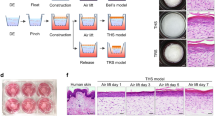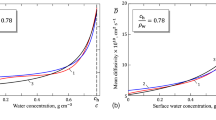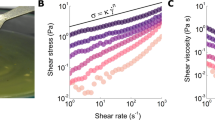Abstract
IT seems to be generally assumed that the application of tensile stress to a textile fibre should reduce the amount of absorbed water in equilibrium with water vapour in the atmosphere at a given value of the relative humidity1. This assumption would appear to be substantiated by the recent work of White and Stam2 on human hair, in which a substantially reversible reduction of water content amounting to 50 per cent was found to occur on the application of a tensile stress of approximately 120 kgm./cm.2.
This is a preview of subscription content, access via your institution
Access options
Subscribe to this journal
Receive 51 print issues and online access
$199.00 per year
only $3.90 per issue
Buy this article
- Purchase on Springer Link
- Instant access to full article PDF
Prices may be subject to local taxes which are calculated during checkout
Similar content being viewed by others
References
Woods, J. Text. Inst., 40, 368 (1949).
White and Stam, Text. Res. J., 19, 136 (1949).
Treloar, Trans. Farad. Soc., 46, 783 (1950).
Flory and Rehner, J. Chem. Phys., 12, 412 (1944).
Treloar, Proc. Roy. Soc., A, 200, 176 (1950).
Barkas, “Swelling Stresses in Gels”, 16 (H.M. Stationery Office, 1945).
Chamberlain and Speakman, Z. Eleletrochem., 37, 374 (1931).
Author information
Authors and Affiliations
Rights and permissions
About this article
Cite this article
TRELOAR, L. Effect of Tension on Water Absorption by Hair. Nature 168, 521–522 (1951). https://doi.org/10.1038/168521b0
Issue Date:
DOI: https://doi.org/10.1038/168521b0
Comments
By submitting a comment you agree to abide by our Terms and Community Guidelines. If you find something abusive or that does not comply with our terms or guidelines please flag it as inappropriate.



